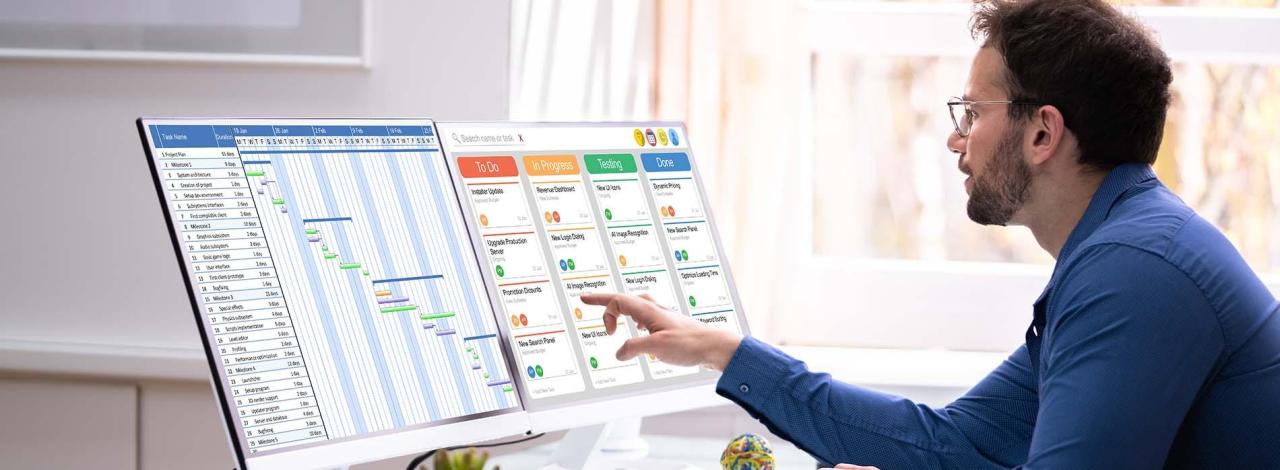Master project manager online stands at the forefront of modern project management, where the digital landscape has transformed how teams collaborate, innovate, and execute tasks. In an era where remote work is becoming the norm, effective online project management is essential for ensuring projects are delivered on time and meet quality standards. This exploration delves into the pivotal skills required for managing projects in an online setting, the tools that facilitate this process, and the strategies to lead remote teams towards achieving their goals.
From mastering essential communication skills that bridge the gap between virtual team members to harnessing cutting-edge technologies for seamless project tracking, the journey of a master project manager online is multifaceted and dynamic. Emphasizing time management and organization, this guide will equip aspiring project managers with the knowledge they need to thrive in a digital workspace.
Key Skills Required for a Master Project Manager Online
In the realm of online project management, the ability to navigate digital tools and remote interactions is paramount. A master project manager must harness a diverse set of skills to ensure successful project execution in a virtual environment. This involves not only technical know-how but also soft skills that can bridge the gap created by physical distance.Effective communication plays a crucial role in remote project management.
With teams often spread across different locations and time zones, the capacity to convey ideas, delegate tasks, and provide feedback becomes essential. It helps to eliminate misunderstandings and aligns team members toward common goals.
For those interested in public administration, an mpa master provides a robust foundation in policy analysis, ethics, and management strategies. This advanced degree not only prepares you for leadership roles in government and non-profit sectors but also empowers you to make impactful decisions that benefit communities and improve public services.
Significance of Communication Skills
In an online setting, project managers must excel in various forms of communication, including verbal, written, and non-verbal. The reliance on digital tools for meetings, emails, and chats necessitates clarity and precision. Effective communication skills contribute to a cohesive team environment, fostering collaboration and engagement. The following points highlight the critical aspects of communication skills for online project managers:
- Clarity: Clear articulation of goals and expectations helps in minimizing confusion.
- Active Listening: Understanding team members’ perspectives enhances collaboration.
- Feedback: Constructive feedback is vital for continuous improvement and team morale.
- Adaptability: Flexibility in communication style to suit diverse team members enhances understanding.
Importance of Time Management and Organization
Time management and organizational skills are indispensable for online project managers. With multiple tasks and deadlines to juggle, effective prioritization and scheduling can significantly impact project outcomes. The ability to maintain order while managing virtual workflows is crucial for steering projects toward completion.Key components of time management and organization include:
- Prioritization: Assessing task urgency and importance to allocate time efficiently.
- Scheduling: Utilizing digital calendars and project management tools to keep track of deadlines.
- Delegation: Assigning tasks based on team members’ strengths to enhance productivity.
- Monitoring: Continuously tracking progress to make necessary adjustments in real-time.
Mastering these skills enables project managers to keep their teams on track, adapt to challenges, and ultimately deliver successful project outcomes, which is increasingly essential in today’s fast-paced, online-focused work environment.
Tools and Technologies for Online Project Management

In the dynamic realm of online project management, leveraging the right tools and technologies is crucial for success. The effectiveness of remote teams relies heavily on software solutions that streamline processes, enhance communication, and ensure project deliverables are met on time. Below, we explore the most effective software tools available for managing projects remotely, the role of collaboration platforms in fostering team communication, and the integration of various project management applications with broader business systems.
Effective Software Tools for Managing Projects Remotely
A variety of software tools are specifically designed to meet the needs of online project management. Each tool offers unique features that cater to different aspects of project tracking and team collaboration. Here are some of the most widely used tools in the industry:
- Trello: Utilizing a card-based system, Trello allows teams to create boards for different projects, facilitating easy task assignment and progress tracking.
- Asana: Asana offers a comprehensive task management system that allows teams to set deadlines, assign tasks, and visualize project timelines with Gantt charts.
- Jira: Particularly popular among software development teams, Jira provides robust issue tracking and agile project management capabilities, enabling teams to manage sprints and track bugs efficiently.
- Slack: Although primarily a communication tool, Slack integrates with various project management apps, ensuring real-time updates and discussions among team members.
- Microsoft Teams: This platform combines chat, video conferencing, and file sharing, making it an all-in-one solution for team collaboration and project management.
Enhancement of Team Communication and Project Tracking
Collaboration platforms play an instrumental role in enhancing communication within teams working remotely. These platforms not only facilitate discussions but also ensure that all project-related information is easily accessible and updated in real-time. One significant advantage of using collaboration tools is the ability to maintain a centralized communication hub. This allows team members to share updates, ask questions, and provide feedback without the need for endless email threads.
Features such as direct messaging, file sharing, and integrated video calls help establish a more cohesive team environment.Additionally, these platforms often come with project tracking features that allow teams to monitor progress against timelines, ensuring transparency and accountability. When everyone has access to the same information, it minimizes misunderstandings and enhances overall productivity.
Integration of Project Management Tools with Other Business Applications
Integrating project management tools with other business applications is essential for creating a seamless workflow. This integration allows teams to synchronize their project tracking with other functions such as finance, human resources, and customer relationship management (CRM).For instance, tools like Zapier can connect various apps and automate workflows. By integrating project management software with applications like Google Drive, Salesforce, or QuickBooks, teams can streamline processes and reduce manual data entry.Furthermore, this interconnectedness empowers project managers to generate comprehensive reports by pulling data from multiple sources, enabling better decision-making.
For example, a project manager can analyze budget expenditures from a financial application alongside project timelines from management software, leading to more informed strategic planning.
Strategies for Managing Remote Teams

In today’s digital age, managing remote teams has become a crucial skill for project managers. The shift to remote work has necessitated the development of strategies that not only facilitate collaboration but also ensure productivity in virtual environments. Successful remote team management hinges on fostering a sense of community, tracking performance effectively, and maintaining regular communication.
Fostering Teamwork and Collaboration in Virtual Settings
Creating a collaborative environment in remote settings is essential for team cohesion and productivity. Utilizing various strategies can significantly enhance teamwork among remote team members. A well-defined plan includes:
- Utilizing collaboration tools such as Slack, Microsoft Teams, or Asana to streamline communication and project updates among team members.
- Encouraging regular team-building activities, such as virtual coffee breaks or online games, to strengthen interpersonal relationships and build trust.
- Setting up shared digital workspaces where team members can collaborate on documents and projects in real-time, fostering a sense of ownership and teamwork.
- Establishing clear roles and responsibilities to ensure that each team member knows their contribution to the project, which minimizes confusion and promotes accountability.
Tracking Team Performance and Productivity Online
Monitoring the performance and productivity of remote teams requires a tailored approach that leverages technology to provide insights into team dynamics. Key methods for tracking include:
- Implementing project management software like Trello or Jira to visualize progress on tasks and projects, which can help identify bottlenecks.
- Using time-tracking tools such as Toggl or Clockify to allow team members to log hours spent on different tasks, providing a clear picture of productivity levels.
- Conducting regular surveys or feedback forms to gauge team morale and engagement, enabling managers to address any emerging issues proactively.
- Establishing key performance indicators (KPIs) that align with team goals, facilitating objective evaluation of individual and team contributions over time.
Routine for Regular Check-ins and Feedback Sessions
Regular check-ins and feedback sessions are vital for maintaining communication and addressing any concerns promptly. Establishing a structured routine can significantly enhance team dynamics.A recommended routine includes:
- Weekly one-on-one meetings with team members to discuss progress, challenges, and personal development goals.
- Bi-weekly team meetings to review project milestones, celebrate achievements, and brainstorm solutions to any obstacles faced.
- Monthly feedback sessions focused on performance evaluations, where constructive feedback is provided to encourage continuous improvement.
- Utilizing asynchronous video updates to share insights and updates, allowing team members to connect on their schedules while fostering a sense of inclusion.
Effective remote team management involves clear communication, structured routines, and the use of technology to foster collaboration and performance tracking.
In today’s competitive job market, pursuing a master hr management can significantly enhance your career prospects. This program equips you with essential skills in leadership, organizational behavior, and strategic planning, making you a valuable asset to any organization. With the right training, you can effectively manage human resources and drive organizational success.
Certifications and Training for Master Project Managers
In today’s fast-paced business environment, obtaining the right certifications and training is essential for aspiring Master Project Managers. These credentials not only enhance a professional’s skill set but also provide recognition and credibility in the competitive landscape of project management. With many online resources available, individuals can conveniently pursue certifications and training programs that align with their career goals.The following sections Artikel the most recognized certifications for project management, guide on selecting relevant training programs, and resources for continuous learning in the field.
Recognized Certifications for Project Management
Achieving recognized certifications is vital for validating a project manager’s competencies and expertise. These certifications are held in high regard and can significantly bolster one’s career prospects. Here are some of the leading certifications:
- Project Management Professional (PMP): Offered by the Project Management Institute (PMI), PMP is one of the most prestigious certifications that demonstrate an individual’s ability to manage and lead projects effectively.
- Certified ScrumMaster (CSM): This certification focuses on agile project management and equips professionals with the skills to facilitate scrum processes.
- PRINCE2 Certification: Widely adopted in the UK and Europe, PRINCE2 provides a structured project management approach, emphasizing organization and control throughout the project lifecycle.
- Agile Certified Practitioner (PMI-ACP): This certification from PMI recognizes an individual’s expertise in agile principles and practices, making it ideal for managing agile teams.
- Certified Project Manager (CPM): Offered by various institutions, this certification covers essential project management concepts and methodologies.
Guide for Selecting Relevant Training Programs
Choosing the right training program is crucial for effective learning and skill enhancement in project management. Here are key considerations to keep in mind when selecting an online training program:
- Accreditation: Ensure the program is recognized by reputable organizations in the field, such as PMI or APM.
- Curriculum: Review the course content to ensure it covers essential topics relevant to your career goals.
- Delivery Format: Consider whether the program offers live sessions, recorded lectures, or a hybrid format that fits your learning style.
- Instructor Credentials: Research the qualifications and experience of the instructors to gauge their ability to provide valuable insights.
- Peer Reviews: Look for feedback from previous students to understand the effectiveness of the program.
Resources for Continuous Learning in Project Management
Continuous learning is essential for Master Project Managers to stay updated with industry trends and evolving methodologies. Several resources can aid in ongoing education:
- Online Learning Platforms: Websites like Coursera, Udemy, and LinkedIn Learning offer a variety of courses and certifications related to project management.
- Industry Webinars and Conferences: Participating in webinars and conferences provides insights into the latest trends, challenges, and solutions in project management.
- Professional Associations: Joining organizations such as PMI and APM can provide access to exclusive resources, networking opportunities, and professional development events.
- Books and Publications: Regularly reading project management literature, including books and journals, helps in acquiring new knowledge and best practices.
- Online Communities: Engaging with online forums and social media groups dedicated to project management can foster collaboration and knowledge sharing with peers.
Challenges and Solutions in Online Project Management: Master Project Manager Online

In the rapidly evolving landscape of online project management, project managers encounter a unique set of challenges that can hinder their ability to lead effectively. From communication breakdowns to managing deadlines across time zones, understanding these challenges is crucial for success in a digital workspace. Recognizing these obstacles and implementing strategic solutions can significantly enhance team productivity and project outcomes.
Common Challenges Faced by Project Managers in a Digital Workspace
The transition to online project management has introduced several challenges that can impact project teams. These challenges include:
- Communication Barriers: Remote teams often struggle with misunderstandings caused by lack of face-to-face interaction, resulting in misalignment on project goals.
- Time Zone Differences: Coordinating meetings and deadlines across various time zones can lead to delays and increased frustration among team members.
- Technology Limitations: Dependence on technology can be a double-edged sword; technical issues can disrupt workflows and hinder collaboration.
- Lack of Accountability: In a remote environment, team members may feel less accountable for their tasks, leading to decreased productivity.
Effective Solutions for Overcoming Communication Barriers in Remote Teams
To address communication barriers effectively, project managers can employ several strategies to foster clear and consistent communication within their teams:
- Utilize Collaboration Tools: Implementing tools such as Slack, Microsoft Teams, or Asana can facilitate real-time communication and project tracking, ensuring that all team members are on the same page.
- Establish Regular Check-Ins: Scheduling daily or weekly check-ins helps maintain communication flow, allowing team members to discuss challenges and share updates.
- Encourage Open Dialogue: Creating an environment where team members feel comfortable sharing their concerns can minimize misunderstandings and enhance collaboration.
Strategies for Managing Deadlines and Meeting Project Goals in an Online Environment, Master project manager online
Managing deadlines and ensuring that project goals are met in an online setting requires strategic planning and proactive measures:
- Set Clear Expectations: Clearly define project milestones and deadlines to provide team members with a roadmap for success.
- Utilize Project Management Software: Tools like Trello, Jira, or Basecamp can help managers track progress and ensure tasks are completed on time.
- Implement Time Management Techniques: Encourage team members to use techniques such as the Pomodoro technique or time blocking to enhance focus and productivity.
- Monitor Progress Regularly: Utilizing dashboards and performance tracking can help identify potential bottlenecks early, allowing for timely interventions.
“Effective online project management is not just about technology; it’s about fostering collaboration, accountability, and clear communication among remote teams.”